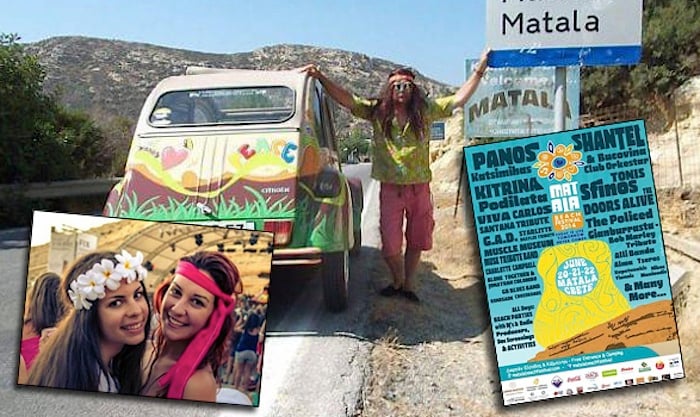

Nestled along the rugged southern coast of Crete, Matala is more than just a beach—it’s a living memory of the 1960s counterculture, a place where music, freedom, and nature once converged to create a cultural phenomenon.
Originally a quiet fishing village, Matala’s fame skyrocketed during the 1960s when it became a refuge for Beatniks and, later, a magnet for Hippies from across the globe. Disillusioned with the rigidity of modern life, these free spirits settled into the seaside limestone caves that overlook the Libyan Sea—natural dwellings carved into the cliffs since Roman times.

The Beatniks were the first to arrive, laying the foundation for what would become a cultural revolution. Soon after, the Hippies followed in droves, turning the small Cretan village into a symbol of peace, liberation, and harmony with nature.
They lived off the land, caught their own food, and embraced a minimalist lifestyle, often roaming the beach half-naked or completely free of clothing. Their way of life was not just about rejecting materialism—it was about finding authenticity in the raw beauty of nature.

Word of this coastal utopia spread quickly. In time, Matala attracted a wave of international celebrities—legends like Janis Joplin, Bob Dylan, and Cat Stevens—who either visited or briefly lived among the cave dwellers. For many, the serene setting of Matala inspired creativity and introspection, influencing their music and message.
Joni Mitchell also visited Matala. She wrote about it in her song “Carey” from her album Blue:
“Oh you’re a mean old Daddy, but I like you…”
“Come on down to the Mermaid Café and I will buy you a bottle of wine…”
The “Mermaid Café” was a popular coffee shop in Matala at the time of her visit.

However, the idyllic dream didn’t last forever. What the Hippies saw as freedom, others viewed as moral decline. By the early 1970s, amidst political unrest and conservative backlash, the presence of long-haired youth, rumors of draft dodgers fleeing the Vietnam War, and the involvement of the Church led to a crackdown.
Greek authorities, under pressure from both religious and political forces, conducted police raids in Matala. Caves were cleared, some Hippies were arrested, and others were relocated to places like Ios. The carefree days of Matala began to fade, and by the end of the decade, the caves were permanently closed.
Though the days of cave-dwelling Hippies are long gone, their legacy still echoes through Matala’s winding streets and colorful murals. The beach is now a popular tourist destination, attracting thousands of visitors each year who are curious about its unique past.
While the atmosphere today no longer resembles the radical freedom of the 1960s, the spirit of Matala lives on—especially during the annual Matala Beach Festival, where music, art, and nostalgia celebrate the village’s vibrant, unconventional history.
